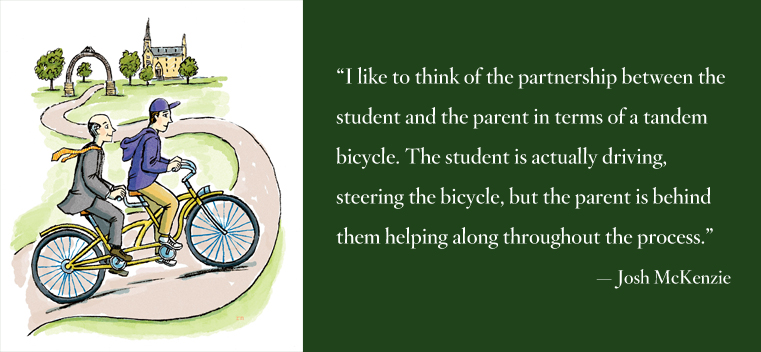
Cutting the Cord
New student orientation can be an incredibly exhausting and emotional time. Parents lug loads of supplies, help deck out the dorm room, fill the fridge and then watch their student enter a new world of autonomy. When orientation is over, it can be hard to say goodbye.
Northwestern’s Wildcat Welcome includes a simple Kiss’n’Bye, a brief pause in the orientation action for farewells and final hugs. “It’s an opportunity for the parents to formally recognize, ‘I’m leaving now. You’re on your own,’” says Elizabeth Block Daly (GSESP09), director of Northwestern’s orientation and parent programs.
It’s likely, though, that shortly after these emotional goodbyes, parents will dial their son or daughter or send a quick text. With today’s technology, this generation of students is incredibly connected — and deeply involved — with their parents.
“In almost any college-bound community parents are urged from the get-go to be involved with their kids: go to their nursery school orientation, volunteer in the classroom, go on the class trips, help them with their homework, nurture their social life and help them build confidence and a record that will make them attractive to colleges,” says Abigail Sullivan Moore (GJ78), co-author of The iConnected Parent: Staying Close to Your Kids in College (and Beyond) While Letting Them Grow Up (Free Press, 2010). “That’s the suburban legend that has driven a lot of parental involvement, this estimable goal of college.”
Parents enjoy being so close to their children while helping them succeed during these precollege years, and that increases their involvement, Moore adds.
When it comes to college, parents have an increased incentive for involvement because higher education is such a big investment, says Moore. “Colleges are recognizing this, too, and that’s why you’re seeing so many parent programs appear.”
As part of Wildcat Welcome, Northwestern offers a parent-focused orientation, including an event with President Morton Schapiro, followed by a reception on North Beach, and a “carnival of resources” and other information sessions, “events geared toward making our parents true partners with their student,” says Josh McKenzie, assistant director of Northwestern’s orientation and parent programs. (The University created McKenzie’s position last year in response to the need for parent programming.)
“I like to think of the partnership between the student and the parent in terms of a tandem bicycle,” McKenzie says, dismissing the overused “helicopter parent” label. “The student is actually driving, steering the bicycle, but the parent is behind them helping along throughout the process.
“We do want the parents to be a part of the process, but we don’t want them driving it. We don’t want them registering their student for classes or doing other things that hinder the educational experience.”
Before students head off to orientation, Moore says parents should establish a communication plan, setting realistic limits and expectations for communication with their students. It’s also important, she says, to let the students take the lead on how they want to communicate. According to research and reporting for The iConnected Parent, the students who have greater say in how and how often they communicate with parents tend to have a better relationship with their parents and to perform better academically.
Moore, who has a son in college and writes about education issues as a New York Times contributor, says parents need to encourage autonomy, allowing their students to find their own solutions to everyday problems.
“If you get a couple of quick calls during the week or a funny text or a photo, those are day-brighteners. Those are great,” she says. “But you don’t want to get into having your student call you in situations where he or she should be making age-appropriate decisions.”
Dean of Students Burgie Howard often advises parents that during the first few months of school, students might only call when dealing with a problem. Back at home, a parent might intervene to provide a solution. Step back, Howard tells parents, and wait 48 hours. Let them figure it out or move on. If they still need assistance, then have them call someone at the University.
“Every parent who comes to us is doing so with the best of intentions, and we recognize that,” Daly says. “We also try to communicate with the students first, to help the parents also understand that the students are adults, this is their experience. The students are responsible for being successful here. You can’t take classes for them. You can’t make sure they’re getting up every morning. There’s a certain level of responsibility that has to happen here.”



 Facebook
Facebook Twitter
Twitter Email
Email


